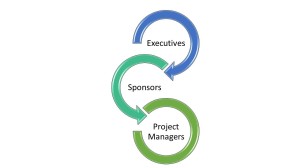(50 Shades of Project Management that is anything but grey!)
At a recent major conference for project managers, after the opening keynote speech, the audience was invited to ask questions of the renowned ambassador for the project management profession. One question that somewhat took the speaker aback was ‘when will project management be sexy?’
A great question I felt and one that the speaker responded to reasonably well (eventually, after the initial shock…) but a question that has made me think about the concept of ‘sexy project management’ for some time since that particular event.

What do we mean, in this context, by ‘sexy’? Well the dictionary offers us three possibilities:
1. Concerned predominantly or excessively with sex; risqué: a sexy novel
2. Sexually interesting or exciting; radiating sexuality: the sexiest presenter at the conference
3. Excitingly appealing; glamorous: a sexy new car
I think we can leave options 1 and 2 alone, of course there must be some real sexy project managers out there and I am sure one or two of them partake of the whole ‘physical’ stuff (perhaps even occasionally with another project manager and perhaps even without the safety aid of a WBS) but for the purpose of this conversation I am going with option 3 ‘Excitingly appealing; glamorous’.
Many (way too many) people think of project management as dull and worthy, and boring and necessary, and as ‘well someone has to do it I guess but I’m glad it is not me’.
An example of this can be seen with a simple experiment – find a project manager and ask them two questions, the rule being they must answer fast with their first thought, the first thing that comes to mind. Do that and it will most likely go something like this:
‘What are you?
‘A project manager’
‘What do you do?’
‘I… er … manage projects’
And there you have it – explaining project management in an attractive way is not so simple, for any of us – experienced project managers or would be project managers.
Probably not overly scientific but there was a survey[1] of 1.000 Australians asking to name the top ‘sexy’ professions and this is what they came up with:
5 sexiest professions for men are.
- Soldier
- Emergency Service Personnel
- Tradesmen/Construction Worker
- Sportsmen
- Doctor
5 sexiest professions for women are:
- Sport/Recreation
- Medical Worker
- Hospitality/Tourist
- Student
- Lawyer
Seriously! We are less attractive than lawyers!
There are plenty of other similar surveys (mainly from dating sites I note with interest – in this case maybe you should not put ‘project manager’ down if you are lonely and single.
But I digress; back to the important question of ‘How do we make project management sexy?’
Perhaps we can consider those who are entering our ‘profession’ these days what is it that attracts them to this job? I mean there must be some reason that these people decide not to be soldiers, lawyers, doctors etc and instead choose to be project managers (or at least study to be project managers).
I took the liberty to check out a number of UK Universities who were offering a project management degree. What did they say to attract people to their courses, and to project management?
Sadly what I found was that they said very little that gave any indication that project management was an exciting, energising, fun and important job. Here are a few examples:
‘The MSc Project Management is designed for those who wish to develop their project management skills and abilities’
‘Project management is now a mainstream management discipline in many organisations. This course provides a solid grounding in the principles and practice of project management with the overall aim of increasing your ability to contribute to business effectiveness’
‘It is designed to meet the increasing demand for professional project managers, both nationally and internationally, who are able to provide the increasingly sophisticated management required to meet the challenges of providing and managing projects across a broad spectrum of organisations’
‘The course focuses on developing skills for careers in project management including both theory and applied aspects, and is mapped against key professional body competencies. The knowledge, understanding and skills can be applied to a range of environments that bring together resources, skills, technology and ideas to realise benefits or achieve objectives, operating within the multiple project constraints of cost, scope, time and quality requirements’
Nothing particularly thrilling in these ones, worthy statements all of them, but how do they use this to attract those future project managers?
What about the thoughts on project management itself?
‘Project management is about how you deliver a defined set of changes at the right time, the right cost and the right quality’
‘Project Management is the application of appropriate management strategies in order to effectively coordinate the realisation of complex and dynamic projects. The applied skills and competencies of a project manager are necessary for the successful completion of large and complex projects, particularly within the ever-changing marketplace’
‘Project management is about managing the technical, cultural, political and financial aspects inherent in all projects’
‘In every business, and in every industry, there is a need for effective project management’
‘A successful project manager balances the conflicting goals of resource usage, quality of product, time to market and customer satisfaction. The programme is intended to provide the student with the technical and process skills to undertake the role of a project manager in the modern business environment’
OK, I am a project manager and know how great this job can be but for goodness sake even I am yawning at this point. There must be something more engaging to say about project management surely?
‘In the twenty-first century, the dynamic and challenging world of business has encouraged the increasing use of project management across the sectors’
True.
‘Organisations, businesses and governments are more aware than ever of the strategic importance of effective project management’
Also true.
‘Offer a foundation of essential management skills required to align and cascade corporate strategy throughout the organisation’
And this can’t be argued with either.
‘The line between success and failure in any project is a lot of pressure on any manager’s shoulders. Empowering yourself with project management skills and business acumen will ensure you can be a successful, dynamic leader’
But for goodness sake you wise and clever educational leaders find something more interesting to say, something (dare I say it) ‘sexy’ to say to attract the very best of the best to the courses you offer.
Now I freely admit this was a fast and dirty check on Universities websites so please if you head up such a course and you have something really attractive, exciting, energising and ‘sexy’ that you do say about project management please do let me know I would be delighted to read it.
Moving away from the universities what about the project organisations we all know and love?
PMI, when speaking of the PMP[2] states ‘The PMP recognizes demonstrated competence in leading and directing project teams. If you’re an experienced project manager looking to solidify your skills, stand out to employers and maximize your earning potential, the PMP credential is the right choice for you’
Axelos when referring to the PRINCE2[3] qualification (foundation) states ‘The purpose of the foundation qualification is to confirm you have sufficient knowledge and understanding of the PRINCE2 method to be able to work effectively with, or as a member of, a project management team working within an environment supporting PRINCE2’
And APM, when describing the RPP[4], state ‘APM Registered Project Professional (RPP) is a pan-sector standard for those able to demonstrate the capabilities of a responsible leader, who have the ability to manage a complex project and use appropriate tools, processes and techniques’
Again, all oh so worthy and technically accurate, but so what?
Let me give an example of what I am talking about. My son is taking driving lessons to learn to be able to drive on his own eventually. Now the DVLA describes the mandatory practical test (there is a theory component as well) as ‘The practical driving test is designed to see if you – can drive safely in different road and traffic conditions and know the Highway Code and can show this through your driving ability’
Now why does my son what to take this test? Why does he want to be a qualified driver? Certainly not so that he ‘knows the Highway Code’ or so that he is able to ‘drive safely in different road and traffic conditions’. Nor is it because he is desperate to be able to parallel park, reverse around a corner or complete a ‘three point turn’ (as I still call it).
All of this is, of course, important but this is only a means to an end.
He wants ‘Freedom’. He wants to escape us, his parents. He wants to be able to visit his girlfriend without catching two buses, especially when it is cold and raining. He wants to be able to take his mates out and about town. He wants to be able to stay out later. He wants a whole lot more that the technical capability of being able to safely control a mechanised object. If there was no end-result of ‘Freedom’ then he wouldn’t have bothered. ‘Freedom’ and ‘Independence’ are the ‘sexy’ factors that make him want to get out there and take the driving lessons, to read the Highway Code, to take practice theory tests, and to revise and practice ready for that all important test date.
And so it should be with project management.
That one question that took that unsuspecting speaker aback has an answer already.
‘When will project management be sexy?’
Now! It is already.
We just need to find the words to describe it in the right way and, you know what, those students currently studying for their degree in project management know that it is ‘sexy’ already.
Feels good doesn’t it?
[1] VictoriaMilan.com.au April 2013




